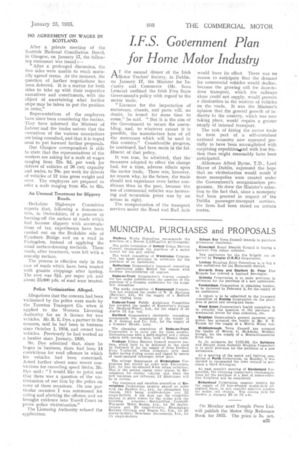NO AGREEMENT ON WAGES IN SCOTLAND.
Page 43

If you've noticed an error in this article please click here to report it so we can fix it.
After a private meeting of the Scottish National Conciliation Board, in Glasgow, on January 17, the following statement was issued :— "After a prolonged discussion, the two sides were unable to reach mutually agreed terms. At the moment, the question of further negotiations has been deferred. It is a matter for both sides to take up with their respective executives and constituents, . with the object of ascertaining what further steps may be taken to put the position in order,"
Representatives of the employers have since been considering the matter. They have informed the Minister of Labour and the trades unions that the executives of the various associations are being consulted, and that it is hoped sooti to put forward further proposals. Our Glasgow correspondent is able to state that the representatives of the workers are asking for a scale of wages ranging from 52s. 6d. per week for drivers of vehicles of 30 cwt. capacity and under, to 70s. per week for drivers of vehicles of 12 tons gross weight and over. The employers are prepared to offer a scale ranging from 45s. to 62s.
An Unusual Treatment for Slippery Reads.
,Berkshire Highways Committee reports that, following a demonstration, in Oxfordshire, of a process oi burning-off the surface of roads which had become slippery with accumulations of tar, experiments have been carried out on the Berkshire side of Eynsham Bridge and on a road in Faringdon, instead of applying the usual surface-dressing methods. These roads, after treatment, were left with a non-slip surface.
The process is effective only in the case of roads which have been treated with granite chippings after tarring. The cost was 38d. per super yd. and about 23,000 yds. of road were treated.
Police Victimization Alleged.
Allegations that the concern had been victimized by the police were made by the Taunton Transport Co. when it applied to the Western Licensing Authority for an A licence for two vehicles. Mr. R. E. Dye, a partner in the concern, said he had been in business since October 1, 1934, and owned two vehicles. Previously he had worked as a haulier since January, 1930, Mr. Dye admitted that, since he began in business, there had been 14 convictions for road offences in which his vehicles had been concerned. Asked further about some recent convictions for exceeding speed limits, Mr. 1)ye said : "I would like to point out I hat there was a question of the victimization of our firm by the police on some of these occasions. On one particular occasion I was summoned for aiding and abetting the offence, and we brought evidence into Yeovil Court to prove police victimization."
The Licensing Authority refused the application.




































































































